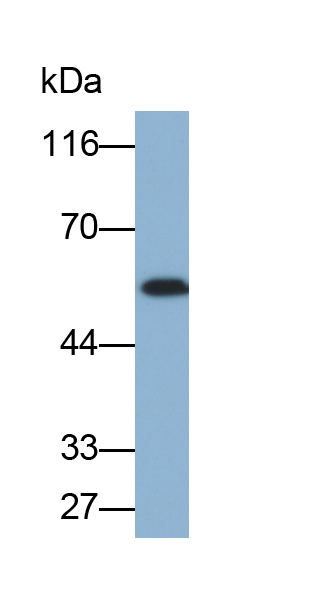Biotin-Linked Polyclonal Antibody to Fascin (FSCN) 

FSCN1; SNL; p55; Singed-like protein; 55 kDa actin-bundling protein; Fascin homolog 1, Actin-Bundling Protein(Strongylocentrotus Purpuratus); Singed,Drosophila,Homolog-Like
- UOM
- FOB US$ 125.00 US$ 293.00 US$ 418.00 US$ 1,045.00 US$ 4,180.00
- Quantity
Overview
Properties
- Product No.LAB757Ra71
- Organism SpeciesRattus norvegicus (Rat) Same name, Different species.
- ApplicationsWBIf the antibody is used in flow cytometry, please check FCM antibodies.
Research use only - Downloadn/a
- CategoryMetabolic pathwayDevelopmental science
- SourceAntibody labeling
- Ig Type IgG, Potency n/a
- PurificationAntigen-specific affinity chromatography followed by Protein A affinity chromatography
- LabelBiotin
- Original Antibody PAB757Ra01-Polyclonal Antibody to Fascin (FSCN)
- Buffer Formulation0.01M PBS, pH7.4, containing 0.05% Proclin-300, 50% glycerol.
- TraitsLiquid, Concentration 500µg/mL
Sign into your account
Share a new citation as an author
Upload your experimental result
Review

Contact us
Please fill in the blank.
Specifity
The antibody is a rabbit polyclonal antibody raised against FSCN. It has been selected for its ability to recognize FSCN in immunohistochemical staining and western blotting.
Usage
Western blotting: 0.01-2µg/mL;
Optimal working dilutions must be determined by end user.
Storage
Store at 4°C for frequent use. Stored at -20°C in a manual defrost freezer for two year without detectable loss of activity. Avoid repeated freeze-thaw cycles.
Stability
The thermal stability is described by the loss rate. The loss rate was determined by accelerated thermal degradation test, that is, incubate the protein at 37°C for 48h, and no obvious degradation and precipitation were observed. The loss rate is less than 5% within the expiration date under appropriate storage condition.
Organism Species More: Homo sapiens (Human)Giveaways
Increment services
-
 Protein A/G Purification Column
Protein A/G Purification Column
-
 Staining Solution for Cells and Tissue
Staining Solution for Cells and Tissue
-
 Positive Control for Antibody
Positive Control for Antibody
-
 Tissue/Sections Customized Service
Tissue/Sections Customized Service
-
 Phosphorylated Antibody Customized Service
Phosphorylated Antibody Customized Service
-
 Western Blot (WB) Experiment Service
Western Blot (WB) Experiment Service
-
 Immunohistochemistry (IHC) Experiment Service
Immunohistochemistry (IHC) Experiment Service
-
 Immunocytochemistry (ICC) Experiment Service
Immunocytochemistry (ICC) Experiment Service
-
 Flow Cytometry (FCM) Experiment Service
Flow Cytometry (FCM) Experiment Service
-
 Immunoprecipitation (IP) Experiment Service
Immunoprecipitation (IP) Experiment Service
-
 Immunofluorescence (IF) Experiment Service
Immunofluorescence (IF) Experiment Service
-
 Buffer
Buffer
-
 DAB Chromogen Kit
DAB Chromogen Kit
-
 SABC Kit
SABC Kit
-
 Real Time PCR Experimental Service
Real Time PCR Experimental Service
Citations
- Serological investigation of the clinical significance of fascin in non-small-cell lung cancerScienceDirect: S0169500213003826
- Fascin-1 is released from proximal tubular cells in response to calcineurin inhibitors (CNIs) and correlates with isometric vacuolization in kidney transplanted patientsPMC5622260
- Clinical significance of fascin-1 and laminin-5 in non-small cell lung cancer.pubmed:28653739
- ЦИркУлИрУЮщИе актИН-СвЯЗЫваЮщИе БелкИ ПрИ ПроГреССИроваНИИ рака ГортаНИ И ГортаНоГлоткИ
- Fascin-1 and its role as a serological marker in prostate cancer: a prospective case–control study34737886






